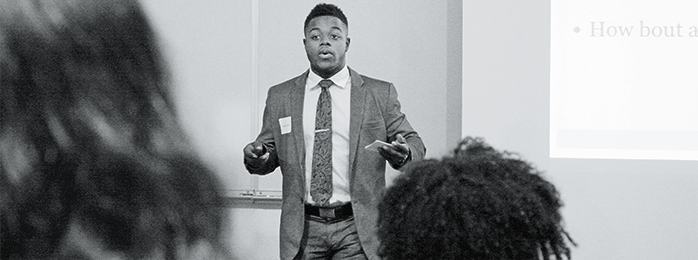
Posner Fellowships Open Doors
Each year, the Posner fellows present their research at a symposium in August. The 2014 fellows researched such diverse topics as medical tourism in Thailand, Latino theater in Chicago and employment issues facing former prisoners.
Victoria Dubose-Briski ’15 was only a few months into her freshman year when she realized she wanted to do research at Northwestern. But the first-generation college student wasn’t sure how or where to begin.
Her inquiries led her to the Posner Fellowship Program, and she was soon on her way to one of the most rewarding experiences of her undergraduate career.
As a Posner fellow, Dubose-Briski spent eight weeks under the mentorship of Weinberg faculty as she researched the effects of the high concentration of metals on Chicago’s South Side. She is still involved with the community today.
“It was rewarding to see the impact research can have on a community and the people living there,” said Dubose-Briski, who is now a senior majoring in environmental science and minoring in chemistry. “That’s one of many experiences I don’t think I would have had without the Posner fellowship.”
Dubose-Briski’s research was made possible by Brian Posner ’83, who founded the Posner Fellowship Program in 2004. Posner’s goal: to provide opportunities for underrepresented minorities to learn how to perform in-depth and sophisticated research in an academic setting. The program is open only to Weinberg College students.
“For every student from a private school, there is another from a rural or urban part of the country who has had a very different educational background and level of support,” Posner said. “Yes, they may do well on their own, but that doesn’t mean there shouldn’t be something there to make their path a little easier.”
The program gives students the skills to do academic research, but what may be even more valuable are the relationships they build with faculty and peers. Indeed, Dubose-Briski, who is one of very few African-American females majoring in the natural sciences, says the program created a community that was critical to her success.
“When you put a group of students together who are similar, who are excited to learn and given the resources to succeed, you can really help them grow,” she said.
Posner agrees, and believes the program could serve as a model for other schools at Northwestern and beyond.
“Top universities could create more good opportunities for underrepresented minorities to do research,” he said. “Being able to work closely with one professor can alter the course of not only their study, but also their lives.”
Back to top